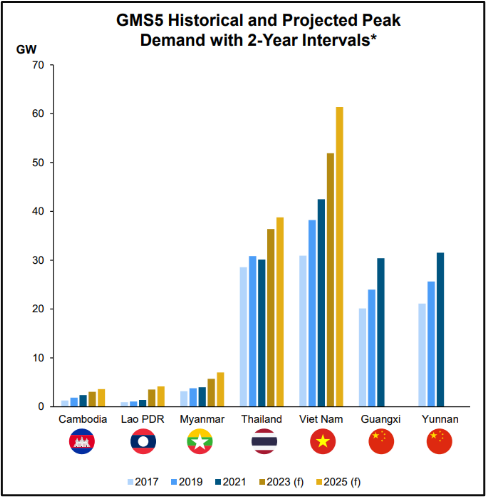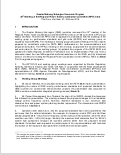
Developing Renewable Energy Mini-Grids in Myanmar: A Guidebook
This guidebook documents experiences and lessons learned from developing 12 pilot mini-grid systems for off-grid energy access in Myanmar.
Greater Mekong Subregion countries are in varying stages of economic development but share common goals concerning energy security and environmental protection. Progress have been made in promoting renewable energy, clean fuels, and energy efficiency, but new energy solutions remain crucial to the subregion’s advancement.
The GMS Economic Cooperation Program Strategic Framework 2030 (GMS-2030) emphasizes cross-border power trade, establishment of regional grid codes, development of regional markets, and expanding clean energy investments with a greater role for the private sector.
The Regional Power Trade Coordination Committee (RPTCC) managed regional power trade in the subregion from 2004–2022. In July 2022, at the 29th RPTCC meeting, the committee formally transitioned to the GMS Energy Transition Taskforce (ETTF). Among other things, the transition to ETTF ushers in closer energy cooperation with the Association of Southeast Asian Nations (ASEAN) and its initiatives, such as the ASEAN Power Grid.
Energy consumption in the GMS countries has grown intensively as their economies develop, driven mostly by residential and industrial sectors. Demand is forecasted to increase materially over the medium term.

GMS countries have used different approaches to increase access to reliable, affordable, and low-carbon energy.
See initiatives of the GMS Energy Transition Task Force to promote energy security in the subregion in a sustainable manner.
Related
Key Energy Resources
Focal Persons at the Asian Development Bank
Hyunjung Lee (lead)
Energy Sector Office
Sectors Group
Atsumasa Sakai
Energy Sector Office
Sectors Group
Other Concerned Staff & Consultants
Joao Aleluia
Energy Sector Office
Sectors Group
Architrandi Priambodo
Energy Sector Office
Sectors Group
Jeffrey Almera
Energy Sector Office
Sectors Group
Pinsuda Alexander
Regional Cooperation and Integration Unit
Southeast Asia Department
Rafaelita Jamon
Regional Cooperation and Integration Unit
Southeast Asia Department/GMS Secretariat
Send inquiries to GMS Secretariat.

This guidebook documents experiences and lessons learned from developing 12 pilot mini-grid systems for off-grid energy access in Myanmar.
Mekong governments need to create an enabling environment for public-private partnerships in infrastructure. Here are 4 ways to get the job done.
The Greater Mekong Subregion has significant potential to develop renewal energy, but it also faces major challenges.

This is the summary of proceedings of the 22nd Meeting of Regional Power Trade Coordination Committee held in Chengdu, People’s Republic China on 19–21June 2017.

The third edition of the Greater Mekong Subregion Statistics booklet includes two new chapters: the Energy Sector and Bilateral Trade.
PHNOM PENH, CAMBODIA (27 June 2017) — The Asian Development Bank is supporting Electricite Du Cambodge in setting up a national solar park program to exploit Cambodia’s abundant solar resources through a transaction advisory agreement.
SINGAPORE (25 April 2017) — The Asian Development Bank has backed Singapore’s Sunseap Group’s project to build Cambodia’s first large-scale solar power project under a long-term agreement with Electricité Du Cambodge.
New transmission lines bring cheaper electricity from the Viet Nam border to Phnom Penh, Cambodia's capital.

This is the summary of proceedings from the 21st Meeting of the Regional Power Trade Coordination Committee (RPTCC-21) and the meetings of the Working Group on Performance Standards and Grid Codes and Working Group on Regulatory Issues held on 8–9 December 2016 in Siem Reap, Cambodia.

This is the summary of proceedings from the 20th meeting of the Regional Power Trade Coordination Committee on 27–28 June 2016 in Phu Quoc Island, Viet Nam.